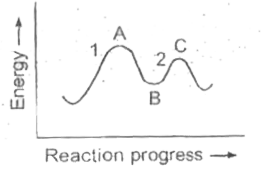For which of the following reactions average molar mass at any progress of reaction can not be 60 gm/mole.
A
SO3(g)→SO2(g)+12O2(g)
B
N2O4(g)→2NO2(g)
C
Cl2(g)→2Cl(g)
D
2NH3(g)→N2(g)+3H2(g)
Text Solution
The correct Answer is:D
2NH3(g)−−→N2(g)+3H2(g)1001−2xx3x
Mavg=(1−2x)17+x(28)+3x×21+2x=60
17=60+120x
x will be -ve which is not possible
|
Topper's Solved these Questions
- TEST PAPERSBOOK - BANSALCHAPTER - TEST PAPERSEXERCISE - CHEMISTRY PART (A)
14 Videos
- TEST PAPERSBOOK - BANSALCHAPTER - TEST PAPERSEXERCISE - CHEMISTRY PART (B)
1 Videos
- TEST PAPERSBOOK - BANSALCHAPTER - TEST PAPERSEXERCISE - Chemistry PART D
4 Videos
- SOLUTIONSBOOK - BANSALCHAPTER - SOLUTIONSEXERCISE - Exercise4
32 Videos
- THERMOCHEMISTRYBOOK - BANSALCHAPTER - THERMOCHEMISTRYEXERCISE - Exercise 4
15 Videos
Similar Questions
Knowledge Check
For which of the following reactions average molecular mass at equilibrium cannot be 60 g/mole.
ASO3(g)⇔SO2(g)+12O2(g)BN2O4(g)⇔2NO2(g)CCl2(g)⇔2Cl(g)D2NH3⇔N2+3H2In which of the following reaction, law of mass conservation is not valid
A.4Be9+.2He4→.6C12+.10nBC+O2→CO2CCH4+2O2→CO2+2H2ODNaOH+HCl→NaCl+H2OWhich of the following reactions can be used to prepare alkanes?
ACorey-House synthesisBWilliamson synthesisCFriedel-Crafts reactionsDGrignard reagent

Reaction progress →
View SolutionWhich of the following can undergo a chemical reaction ?
View SolutionWhich of the following can undergo nuclear fusion reaction ?
View SolutionWhich of the following can undergo haloform reaction ?
View SolutionWhich of the following can undergo a chemical reaction?
View Solution
